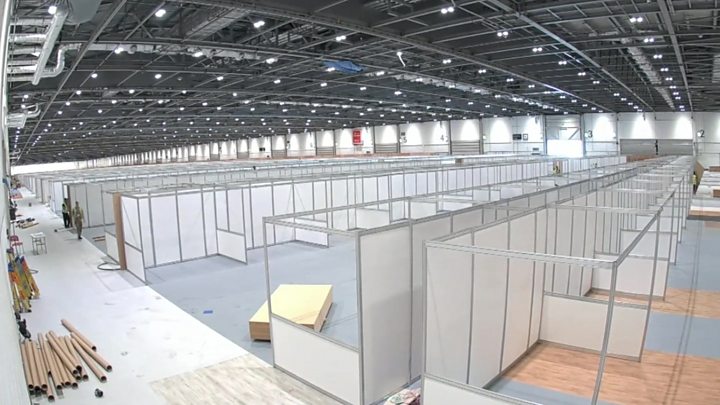Image copyright
Getty Images
Hospitals should use spare laboratory space to test self-isolating NHS staff in England for coronavirus, Health Secretary Matt Hancock has said.
The government faces growing criticism over a lack of testing for frontline staff who could return to work if found clear of the virus.
On Tuesday, Cabinet Office minister Michael Gove admitted the UK had to go “further, faster” to increase testing.
It came as a 13-year-old boy from south London with coronavirus died.
Ismail Mohamed Abdulwahab, from Brixton in south London, is thought to be the youngest reported victim of the disease in the UK.
His family, who said they were “beyond devastated” by his death, said Ismail had no apparent underlying health conditions and tested positive for Covid-19 on Friday, a day after he was admitted to hospital.
The latest daily death toll in the UK rose sharply to 381, taking the overall number of deaths to 1,789, as of 17:00 BST on Monday.
Mr Gove described the rise as “deeply shocking”, adding that “now is absolutely not the time for people to imagine there can be any relaxation or slackening” of lockdown measures.
Testing so far has focussed on patients, though NHS England has told hospitals to use up to 15% of their testing capability on staff, if this is possible.
Mr Hancock has now urged hospitals to go further and test as many staff as they can, with health officials saying laboratories have the capacity to take on more tests.
The government has been repeatedly criticised for having said in recent weeks that testing was a priority, but then not implementing it for frontline NHS workers.
Ministers have announced plans to work with the private sector and universities to scale up testing.
But Mr Gove said at the press briefing that the ability to increase testing capacity was being hampered by the availability of the chemicals needed to test patients.
Chris Hopson, the chief executive of NHS Providers, said if existing NHS pathology labs had unlimited swabs and reagent, there would be enough test machine capacity to process around 100,000 tests a day.
But he said a “reagent and swab shortage is currently limiting this to [around] 13,000 a day”.
While the Chemical Industries Association acknowledged demand was “escalating” it said reagents – used to find out if a reaction occurs – were being manufactured and delivered to the NHS.
“Every business here in the UK and globally is looking at what they can do to help meet the demand as a matter of urgency,” it said, adding companies were continuing to work with government.
Mr Gove said Prime Minister Boris Johnson and Mr Hancock – who are both self-isolating after testing positive for Covid-19 – were working with companies worldwide to get the materials needed.
Image copyright
PA Media
Staff at the University Hospital of Wales in Cardiff are among those carrying out a diagnostic test for coronavirus
Speaking at the government’s daily coronavirus briefing, Mr Gove said: “More NHS staff are returning to the front line, and more testing is taking place to help those self-isolating come back, and to protect those working so hard in our hospitals and in social care.
“But while the rate of testing is increasing, we must go further, faster.”
The Royal College of Physicians this week said as many as a quarter of doctors are off work because they are having to self-isolate – either because they are showing symptoms or a member of their household is.
A fifth of nurses have been affected, the Royal College of Nursing said, while the British Medical Association said staff began being tested over the weekend, but only in low numbers.
BMA chairman Dr Chaand Nagpaul said: “It’s been well over two weeks since the government said it was going to roll out priority testing for healthcare staff.
“But many doctors still have no idea about where or how they can get tested.”
Conservative former Health Secretary Jeremy Hunt said it was “very worrying” that the government had not introduced mass testing.
He said it had been the key to finally controlling the outbreak in Wuhan, the Chinese city where the disease first appeared. “It is internationally proven as the most effective way of breaking the chain of transmission,” Mr Hunt said.
Professor David Heymann, a former chair of Public Health England, told BBC Radio 4’s Today programme he knew the government was implementing community studies to determine hotspots of infections in Britain.
“I happen to know that there are studies being planned by Public Health England and by others around the UK to determine what the actual extent of transmission has been,” he said.

Media playback is unsupported on your device
In other developments:
- Some of the UK’s biggest banks have agreed to scrap dividend payments and hold onto the cash, which may be needed during the coronavirus crisis
- Stock markets around the world suffered historic losses in the first three months of the year amid a massive sell-off tied to the crisis
- New research suggests a loss of smell or taste may be a sign that you have coronavirus
- Anti-malarial drugs are among those being tested in UK clinical trials in a bid to find medicines to help lessen the effects of coronavirus
- A coronavirus app that alerts people if they have recently been in contact with someone testing positive for the virus “could play a critical role” in limiting lockdown
- Pregnant prisoners could be granted temporary release from prison “within days” to protect them and their unborn children from the virus
